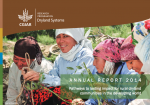The 2014 Annual Report of the CGIAR Research Program on Dryland Systems, titled ‘Pathways to Lasting Impact for Rural Dryland Communities in the Developing World,' outlines its contribution to shaping “thinking and practice” on agricultural livelihood systems, and notes that this resulted in “real development impact” during the year.
 16 July 2015: The 2014 Annual Report of the CGIAR Research Program on Dryland Systems, titled ‘Pathways to Lasting Impact for Rural Dryland Communities in the Developing World,’ outlines its contribution to shaping “thinking and practice” on agricultural livelihood systems, and notes that this resulted in “real development impact” during the year.
16 July 2015: The 2014 Annual Report of the CGIAR Research Program on Dryland Systems, titled ‘Pathways to Lasting Impact for Rural Dryland Communities in the Developing World,’ outlines its contribution to shaping “thinking and practice” on agricultural livelihood systems, and notes that this resulted in “real development impact” during the year.
In his introductory message, Dryland Systems Program Director Richard Thomas points out that dryland communities in the developing world have suffered a history of neglect and explains that a key goal of the research partnership is to “overturn this neglect and shape the drylands discourse by producing a robust body of scientific knowledge that includes technological, policy and institutional innovations to address major dryland challenges.”
The report highlights the results of collaborative research undertaken with 227 partners and 45 innovation platforms, which focused on identifying and leveraging drivers to bring about improvements in dryland agricultural livelihood systems at local, national and global scales.
Among concrete achievements in 2014, the report highlights, inter alia: establishing 25 databases giving unrestricted online access to spatial data through the open-access Geoinformatics Portal; involving nearly 400,000 farmers from Africa, Asia and the Middle East in field-trials to apply and adopt sustainable natural resources management practices; providing “comprehensive, multidimensional gender-responsive livelihood data” to more than 3,000 household farms; and establishing village-based seed enterprises in several African countries to integrate community-based seed production systems into inclusive food value chains and open up opportunities for women and young people to set up their own agro-entrepreneurial activities.
The CGIAR Research Program on Dryland Systems brings together eight CGIAR centers, as well as international, regional, and national partners engaged in integrated agricultural systems research. [CGIAR-ICARDA News Announcement] [Publication: Pathways to Lasting Impact for Rural Dryland Communities in the Developing World] [CGIAR Drylands Systems Website]